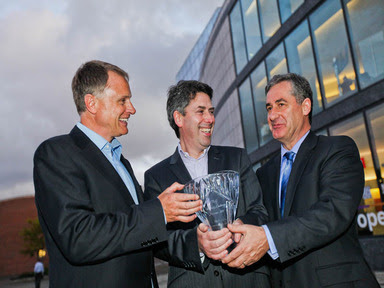Last summer, the University of Wales Global Academy established an office in Silicon Valley, California, the global centre for innovative and entrepreneurial businesses.
Based at the Irish Innovation Centre (IIC) in San Jose, the self-proclaimed capital of Silicon Valley, the aim of the office is to provide a presence for Welsh businesses that felt ready to present their innovation technology to potential investors, taking advantage of the soft-landing that the IIC provides to companies already based there.
As most of you are no doubt aware, Silicon Valley is where some of the leading high technology businesses in the World are to be found, with great companies such as Apple, Cisco, eBay, Google, Hewlett Packard, Intel and Yahoo having their corporate headquarters located there.
And of course, let’s not forget that it is also the home of Facebook, a company that was started in a bedroom eight years ago but which, in the next few months, will undertake a stock market flotation that is estimated to value the company at $100bn (£65bn), making billionaires of its founders and backers, including Mark Zuckerberg, who is still only 27 years of age.
However, the region has faced some challenges over the last few years and like every other part of the USA, even the Silicon Valley economy was not immune to the severest recession since the 1920s. But similar to the aftermath of the dot.com bubble burst a decade ago, it is mounting yet another remarkable comeback. In fact, according to a recent review of the region, more than 42,000 new jobs were created in 2011, which represented an increase of 3.8 per cent as compared to the US average of 1.1 per cent.
Innovation has also begun to fire again, with patent registrations increasing by 30 per cent in twelve months. And venture capital investment increased by 17 per cent with a specific focus on biotechnology and medical devices. In 2011, around a third of venture capital invested nationwide - £5bn - went to Silicon Valley companies.
These are some of the reasons why I am passionate about getting companies from Wales to visit. Even by having a small Welsh presence in the region, there is the potential to make a difference, especially as we have been building up our links through specifically working with the Irish Technology Leadership Group (ITLG) that manages the Innovation Centre.
Established in 2007, the ITLG is a non‐profit group of senior Irish executives from around the world, including some of Silicon Valley's leading corporations, each of whom is committed to promoting the technology connection with major markets in the USA.
By recognising us as fellow Celts who want to work alongside our Irish cousins to develop our respective economies, the ITLG has given us a platform to potentially connect entrepreneurs, technology companies, academics, students and government officials to Silicon Valley.
Over the next few years, we aim to work with the ITLG to make the most of this opportunity through trade missions, networking events, executive introductions and strategic business planning meetings.
The first real opportunity to do this will take place next month, when we lead an innovation mission to San Jose. We are only intending to take a small group this time as a precursor to a more extensive visit later this year but if you would like to come along then please get in touch and I am sure we can fit you in.
The main attraction of this visit will be the annual ITLG innovation summit. Thisis a two-day gathering which presents attendees with an inside look at the cutting-edge technology, business and political trends that are creating the most exciting and profitable new opportunities in the world. It will give those who attend the chance to meet venture capitalists, discuss their products and services with other entrepreneurs and technologists and, most importantly, network with other innovative individuals. The organisers are also hoping to have Cardiff-born Michael Moritz, one of the most successful venture capitalists of his generation, attend the event.
The major sponsor of the summit is the venture capital house Andreessen Horowitz, a company set up by Netscape founder Marc Andreessen with the aim of investing in new starts ups. Only last month, it raised a billion pounds for a new fund that will not only be investing in software companies but also in industries such as healthcare and education. Imagine what a boost it would be for our economy if such a world renowned company would consider investing in a business from Wales.
As Sir Terry Matthews, the Newport-born serial high-tech entrepreneur, said last year when the Global Academy announced the decision to have a presence in California, "San Jose and the remainder of Silicon Valley continue as a major concentration of high technology companies and venture capitalists. The new Welsh Innovation Office will be a significant benefit to any new company looking to enter the market for sales opportunities or access to sources of capital.”
No one could disagree with such a statement but it will only be a success if Welsh companies make the effort to come across and show the investors in Silicon Valley that our products and technologies are as good as any in the World.
I look forward to seeing you there in the future.


